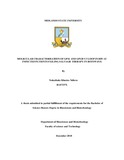Please use this identifier to cite or link to this item:
https://cris.library.msu.ac.zw//handle/11408/3608| Title: | Molecular characterisation of gp41 and gp120 v3 loop in HIV-1c infected patients failing salvage therapy in Botswana | Authors: | Ndlovu, Nokuthula Sibusiso | Keywords: | Multi drug resistance Salvage therapy |
Issue Date: | 2018 | Publisher: | Midlands State University | Abstract: | Multi-drug resistant (MDR) HIV-1 infection remains a challenge in individuals with extensive antiretroviral treatment (ART) experience, in terms of high mortality and probability of onward transmission. New therapeutic options within old drug and new drug classes are therefore essential. This study sought to determine coreceptor usage and T20 resistance associated mutations in patients failing salvage therapy from clinics around Botswana, through characterizing gp120 V3 loop and gp41 of the viral envelop. Thirty-eight blood samples from deep salvage patients were included in this analysis. Gp41 and gp120 V3 regions of HIV-1 envelope were amplified. Drug resistance mutations were analyzed according to the IAS-USA 2017 reference mutation lists. Coreceptor usage was determined using PSSM and Geno2Pheno using a false positive rate (FPR) of 10%. Among 38 participants, 34(89%) GP41 sequences and 25(68%) gp120 V3 loop sequences were obtained. Major T20 resistance mutation G36S and minor mutations E137K, and S138A were observed at a 2.9% frequency each, occurring in different sequences. Polymorphisms N42S(70.6%), L54M(61.8%), A67T(32.4%), I69V(97.1%), V72I(61.8%), E119Q(88.2%), N125S(44.1%), S129D(32.4%), S129N(29.4%), L130T(67.7%), H132Y(97.1%), S133R(44.1%), I135L(100%), Q147K(61.8%), E148D(91.2%), E151A(70.6%), K154S(55.9%), A156N(38.2) and S157N(61.8%) were detected in Heptad repeat 1 (HR1) and heptad repeat 2 (HR2) of gp41. CXCR4 coreceptor associated use, mutation L34M in gp41 HR1 was detected in 2 samples (5%). Analysis of coreceptor usage showed (17/25) 64% use of CCR5, and a (9/25) 36% use of the CXCR4 coreceptor. A moderately high proportion of treatment experienced (salvage) participants had CXCR4 coreceptor using strains (X4 variants). X4 variants are associated with disease progression and ultimately death in absence of treatment. The use of maraviroc in Botswana would require coreceptor tropism testing. Non T20 treatment experience in Botswana reduces the prevalence of the major mutations that confer resistance to the drug. T20 is therefore a potential alternative drug for patients failing salvage therapy in Botswana. | URI: | http://hdl.handle.net/11408/3608 |
| Appears in Collections: | Bachelor Of Science In Applied Biosciences And Biotechnology Honours Degree |
Files in This Item:
| File | Description | Size | Format | |
|---|---|---|---|---|
| Nokuthula S. Ndlovu Dissertation.pdf | Full Text | 1.39 MB | Adobe PDF |  View/Open |
Page view(s)
202
checked on Feb 25, 2026
Download(s)
110
checked on Feb 25, 2026
Google ScholarTM
Check
Items in MSUIR are protected by copyright, with all rights reserved, unless otherwise indicated.



